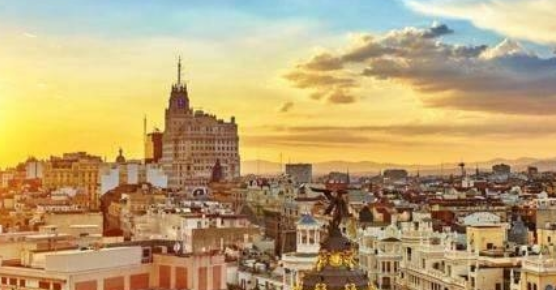(单词翻译:单击)
It is 10pm in the Madrid neighbourhood ofLa Latina, one of the city’s oldest areas, and the cobbled streets thrum withthe sounds of people enjoying plates of gambas al ajillo (garlicprawns) and cocido Madrile?o (a hearty chickpea, pork and chorizostew). Restaurants are bustling at an hour when, in most other countries, chefswould be hanging up their aprons for the night.
夜晚10点,在马德里附近的拉·拉提那——马德里最古老的区域之一,卵石铺就的街道上回荡着人们享用Gambas al ajillo(蒜蓉大虾)和cocido Madrile?o (一种量很大的鹰嘴豆、猪肉和口利佐香肠做成的炖菜)时欢乐的杯盘撞击声。在这个时间段,马德里的餐馆里人头攒动,而在其他大部分国家,餐馆大厨们已经把围裙挂起来下班了。
While travellers might attribute Spain’slate mealtimes to the country’s laidback Mediterranean attitude, the realreason is a little more peculiar. Spaniards are living in the wrong time zone,and have been for more than 70 years.
游客们把西班牙的迟来的吃饭时间归结为懒散的地中海居民习惯,但真正的原因却有点奇怪。西班牙人生活在错误的时区,而且已经这样生活了超过70年。
Spain goes by Central European Time,putting it in sync with Serbia (Credit: Facto Foto/Getty)
西班牙采用欧洲中央时间,与塞尔维亚同步(版权:Facto图片/Getty )
Glance at a map and you’ll realise thatSpain – sitting, as it does, along the same latitude as the UK, Portugal andMorocco – should be in Greenwich Mean Time (GMT). But Spain goes by CentralEuropean Time (CET), putting it in sync with the Serbian capital Belgrade, morethan 2,500km east of Madrid.
看一眼地图,你会意识到西班牙处于与英国、葡萄牙和摩洛哥相同的纬度上——应该采用格林威治时间(GMT)。但是西班牙采用欧洲中央时间(CET),这让马德里跟塞尔维亚首都贝尔格莱德——一座2500公里外的城市的时间同步。
So why are Spaniards living behind theirgeographic time zone?
那么为什么西班牙人要采用这种跟实际地理位置对不上的时区划分呢?
In 1940, General Francisco Franco changedSpain’s time zone, moving the clocks one hour forward in solidarity with NaziGermany.
在1940年,弗朗西斯科·弗朗科将军改变了西班牙的时区,把时钟往前提了一小时,以便跟纳粹德国保持一致。
For Spaniards, who at the time were utterlydevastated by the Spanish Civil War, complaining about the change did not evencross their minds. They continued to eat at the same time, but because theclocks had changed, their 1pm lunches became 2pm lunches, and they weresuddenly eating their 8pm dinners at 9pm.
对西班牙人来说,饱尝了内战痛苦之后,他们压根就没想过抗议时间调整这件事。他们还在老时间吃饭,但因为钟表被调过了,他们下午1点的午餐变成了2点的午餐,晚上8点的晚餐突然变成了9点的晚餐。
After World War II ended, the clocks werenever changed back. However, in 2016, Spanish Prime Minister Mariano Rajoy announced that thegovernment was working on a plan to implement a new workday schedule ending at6pm as opposed to 8pm. One important element of the plan was uating thepossibility of changing Spain’s time zone from CET to GMT – something that hassparked a heated discussion throughout the country.
二战结束后,时钟并没有被调回来。但是在2016年,西班牙首相马里亚诺·拉霍伊宣布政府正在研究落实一个新的工作日时间安排方案,把晚餐从8点提前到6点。这个方案的一个重要因素就是论证把西班牙的时区从CET改为GMT的可能性——这在全国范围内引起了热议。
With work days ending at 8pm, Spaniardssave their social lives for the late hours (Credit: Stefano PolitiMarkovina/Alamy)
工作在晚上8点结束,西班牙人把社交活动留给了深夜(版权:Stefano Politi Markovina/Alamy)
Being 60 minutes behind the correct timezone means the sun rises later and sets later, bestowing Spain with gloriouslylong summer evenings and 10pm sunsets. Those who run Spain’s tourist resortsbelieve that more sunlight is a large draw for visitors. The regionalgovernment of the Balearic Islands ? which includeMallorca, Menorca and Ibiza ? is strongly againstreturning to GMT and has even campaigned to maintain year-round summer time(CET+1) to allow visitors to take full advantage of the region’s mild winter climate.
由于比正确的时间晚了60分钟,太阳升起时间变晚,落下时间也变晚,这给予了西班牙漫长的夏季夜晚,太阳在晚上10点才落下。西班牙的旅游从业者们认为更长的白天能极大地吸引观光者。巴利阿里群岛——包括了马略卡、梅诺卡和伊比萨岛——的地方政府强烈反对回归GMT时间,甚至为了保留夏时制(CET+1)而抗争,以便让旅游者能够充分享受本地温和的冬季气候。
But for many Spaniards, living in the wrongtime zone has resulted in sleep deprivation and decreased productivity. Thetypical Spanish work day begins at 9am; after a two-hour lunch break between 2and 4pm, employees return to work, ending their day around 8pm. The laterworking hours force Spaniards to save their social lives for the late hours.Prime-time television doesn’t start until 10:30pm.
但是对很多西班牙人来说,错误的时间让他们睡眠不足,工作效率降低。西班牙标准的工作时间从上午9点开始,在下午2点到4点是午餐时间,之后雇员们要工作到晚上8点才下班。这让西班牙人不得不把社交活动放在了深夜。电视的黄金时段从夜里10点半才开始。
Meanwhile, in the northwestern region ofGalicia, the sun doesn’t rise until after 9am in winter, meaning that residentsare starting their day in the dark.
同时,在西北部的加里西亚,冬季太阳升起时间晚于上午9点,这意味着居民们要摸黑上班。
The time difference results in long summerevenings and 10pm sunsets (Credit: PhotoStock-Israel/Alamy)
错误的时区划分使夏季夜晚变长,太阳在晚上10点落山(版权: PhotoStock-Israel/Alamy)
“The fact that the time in Spain doesn’tcorrespond to the sun affects health, especially sleep,” said José Luis Casero,president of the National Commission for the Rationalization of SpanishSchedules, an organisation that has been campaigning for Spain to return to thecorrect time zone since 2006. “If we changed time zones, the sun would rise onehour earlier and we’d wake up more naturally, meal times would be one hourearlier and we’d get an extra hour’s sleep.”
“事实上,西班牙目前采用的时间跟太阳照射时间不符,这会影响健康,尤其是睡眠,”胡塞·路易·卡塞罗——西班牙时间合理化国家委员会的主席说。这一组织从2006年起开始为西班牙回归正确的时区而奋斗。“如果我们改变时区,太阳会提前一小时升起,我们也会更自然地醒来,饭点会提前一小时,我们就多了一小时的睡眠时间。”
Spaniards have traditionally coped withtheir late nights by taking a mid-morning coffee break and a two-hour lunchbreak, giving them the opportunity to enjoy one of the country’s most infamoustraditions: the siesta.
西班牙人为了适应迟来的夜晚,会在上午设一个喝咖啡时间以及两个小时的午休,这让人们能够享受这个国家最声名狼藉的传统:午睡。
Changing the workday would threatenSpaniards’ customary naptime, although whether or not citizens would mind isstill up for debate. A January 2017 study byresearch company Simple Lógica found that less than 18% of Spaniards napregularly, while nearly 60% never take a siesta. In fact, business owners inmany of the country’s major cities and holiday resorts remain open during themidday break to cater to tourists.
改变工作时间会威胁到西班牙人习惯的午睡时间,尽管人们是不是介意这一点还有待争论。一项在2017年1月由Simple Lógica公司所做的调查显示不到18%的西班牙人有午睡习惯,而将近60%的人从不午睡。事实上,在这个国家的大城市和景区的店主们在午休时间仍然营业,以便赚游客们的钱。
Meanwhile, those who do nap expressfrustration when changes in their daily routine prevent them from sleepingmid-day.
同时,午睡者们抱怨对他们日常生活节奏的改变让他们不能睡午觉。
“We should really banish the siesta inSpain because it doesn’t fit with reality,” Casero said. “And with the changeof time zone bringing meal times forward and giving us an extra hour of sleep,there would be less need for a rest at midday.”
“我们应该在西班牙取消午睡制度,因为这根本不实际,”卡塞罗说。“随着时区的改变,晚饭时间提前,我们就多了一个小时的睡眠时间,这样就不需要睡午觉了。”

Changing the workday would threatenSpaniards’ customary siesta (Credit: Ignacio Perez Diez/Getty)
改变时区会威胁到西班牙人的午睡习惯(版权:Ignacio PerezDiez/Getty )
When it comes down to it, economist NuriaChinchilla, an expert in work-life balance at the Instituto de EstudiosSuperiores de la Empresa business school in Barcelona, feels that quality oflife for Spaniards is more pressing than preserving an extra hour or two ofevening light for tourists.
总结起来,经济学家努利亚·钦奇拉——巴塞罗那IESE商学院的工作生活平衡研究专家——认为提高西班牙人的生活质量远比为旅游者多保留一个或两个小时的夏夜来得重要。
“We have continuous jetlag,” she said.“Tourism will always be there and tourists don’t care. The number of hours ofsunlight will be the same, whether it is an extra hour in the morning or in theevening.”
“我们的时差倒不完,”她说。“旅游业一直都有,旅游者们也不在乎。白天的时长不会变,不管所谓早上多了一小时还是晚上多了一小时。”


